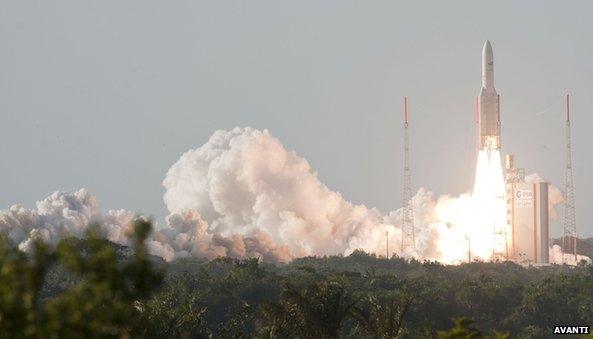Sky-high thinking for African internet
- Published
WATCH: Paul Kukubo: "As more people get connected, it's more effective financially to invest, and the internet gets cheaper"
How do you solve a problem like broadband in Africa?
Some believe it's by looking up to the heavens.
Not in hope of divine intervention, but as an opportunity: satellite-powered broadband could be the answer to Africa's connectivity conundrum.
The internet is, as one US senator once put it, a series of tubes.
His comments went down in internet folklore and were roundly mocked - but his remarks were loosely true. For the internet to get around the world it needs cables - lots of them.
They cost millions, span entire oceans and meander across deserts. Many are laid through some of the world's most volatile areas, such as Syria.
So when it comes to connecting Africa to the high-speed information super-highway, the enormity of the task cannot be over-exaggerated.
Under the sea
In the past few years, the continent has benefited from major investment into its internet economy.
Since 2009, three high-speed internet cables have been laid across the ocean, reaching out from Europe and Asia, and bringing huge speed increases - not to mention lower costs - to east Africa.
Kenya has arguably made the most of this connectivity. In just 12 months after the installation of the high-speed cables, the number of Kenyans on broadband rocketed from 1.8 million to more than 3 million.
With a lot of businesses now able to set themselves up and serve customers online, savings were able to be made across the board.
But cables are expensive - and they break. Earlier this year, cables linking east Africa to the Middle East and Europe were severed in an accident.
Internet users' connectivity suffered for more than three weeks - with data transfer rates in nine countries taking a serious, crippling hit. Such long-term technical problems undermine Africa's credibility as a potential future global technology hub.
Coupled with the logistical barrier associated with enabling internet connections in the most rural parts of Africa, and it's arguable that a rethink is desperately needed.
Up into space
Avanti's rethink launched into space on 2 August.
The company says its satellite, Hylas 2, will bring high speed connectivity to southern and eastern Africa, the Middle East and the central Asia.
The growth potential for businesses on the ground, Avanti chief executive David Williams says, is simply enormous.
"We have always believed there is a huge opportunity for satellite communications services in emerging markets because growth for data and voice services is high whilst supply of telecoms network capacity is low," Mr Williams says.
"This is very attractive to Government and enterprise customers, particularly those working in oil, mining, agriculture, banking and security sectors."

Hylas 2 was the second of three satellites to be launched. Hylas 3 is due in 2015
The satellite is the company's second to reach orbit. The first, Hylas 1, went up in 2010, and the company plans another - Hylas 3 - for 2015.
Hylas is shorthand for "Highly Adaptable Satellite", an apt name which describes one of its key attributes - the ability to direct its beams to different areas of the continent in order to satisfy demand.
All of the satellites utilise the Ka-band frequency, which operates in the 30Ghz section of the radio spectrum. Avanti says this means it is able to offer 99.9% uptime, no matter what the weather conditions may be.
It is hoped that the satellites build on the progress brought by the undersea cables and lower the cost of broadband further, be it residential users or those running a business.
Although costs have become far cheaper since cable installations, broadband is still prohibitively expensive.
For example, in Kenya, a small business broadband connection can cost around £60 a month for a relatively slow connection of 256kb per second.
Better than the West
With the new satellites, Avanti says it can offer 8MB connection speeds for around £20 - a dramatic rise in speed coupled with what some believe is a game-changing drop in price.
"Whatever the investments that you see happening, they will [all] make the internet cheaper," says Paul Kukubo, chief executive of the Kenyan ICT board.
"The internet is getting cheaper anyway," he tells the BBC.
"It's getting cheaper on two accounts - investments and also the economies of scale.
"As more people get connected, it's more effective financially to actually invest and therefore the internet gets cheaper."

David Williams is the man behind the Hylas satellites
He argued that lessons can be learned from the mobile networks who, with enhanced technology, were able to offer individuals and businesses attractively-priced internet connectivity, even in rural areas.
As a result, Africa has in fact left the developed world in its wake when it comes to adopting breakthrough mobile technologies - particularly mobile payments such as the hugely popular M-Pesa system.
In Angola, this kind of mobile connectivity is being taken to the next level. In partnership with Chinese telecoms firm ZTE, the country is rolling out 4G mobile infrastructure.
It means Angola, which just over 10 years ago was in the grip of a civil war, will offer its citizens better and faster mobile coverage than is currently on offer in London. Other countries, like Namibia, are attempting to follow suit.
Africa's surge in mobile internet use can be repeated in the fixed broadband world, Mr Kukubo says.
"We've got good examples of people who have made money by providing connectivity to the rural communities," he said.
"The large telephone networks have priced their products in a way that allows people to access it through cellphones."
He believes that by encouraging more businesses to adopt broadband services, the knock-on effect will see a significant change in costs as prices are lowered across the board.
"As consumers [learn] what to do online, you get greater usage, and that usage also drives the prices down, and also drives greater business applications, greater consumer applications.